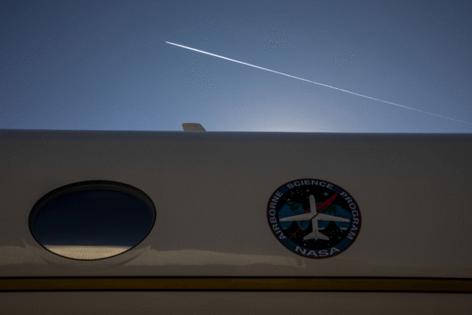NASA Langley workforce slashed by 40% in Trump budget plan
Published in Political News
NASA Langley Research Center in Hampton, Virginia, will lose funding for several projects and cut its workforce by 672 civil servants under the Trump administration’s proposal to slash about $163 billion in federal spending next fiscal year.
The White House budget proposal is a starting point, and ultimately Congress must approve it. But the technical supplement to the proposed budget released on Friday includes new details about how the administration would seek to reduce federal spending levels. NASA’s budget would be slashed by roughly a quarter — from $24.8 billion down to $18.8 billion — and would lay off nearly a third of its workforce — more than 5,500 people across its 10 staffed centers. The technical supplement said centers will use cross-mission retraining opportunities and offer buyouts to meet the staffing requests.
For NASA Langley, that includes a staffing cut from 1,730 people to 1,058.
NASA Langley spokesperson Brittny McGraw said Langley doesn’t have any additional context for how the cuts would work.
“At this point, there are no decisions that have been made going forward about what things could look like,” McGraw said.
Another major shift proposed for Langley would be in its Aerosciences Evaluation and Test Capabilities. NASA currently operates 12 wind tunnels and propulsion test facilities, seven of which reside at Langley. The proposed budget would replace an 84-year-old vertical spin tunnel with a new flight dynamics research facility at Langley.
However, there’s a catch. The proposed budget slashes Aerosciences funding by more than $40 million and will put up to five unspecified wind tunnels in “stand by” mode with minimal maintenance.
Aerosciences isn’t the only program being hit with cuts to meet the budget request. NASA’s science programs across the board are set to be gutted to meet the new goals.
Science funding is seeing its funding cut from $7.3 billion to $3.9 billion. That includes:
—Earth Science research funding cut by $240 million.
—Earth systematic missions, which study the planet’s biology, having its budget more than halved.
—The Sentinel-6 project, which studies sea levels, cut from roughly $51 million to $8 million.
—The GRACE-Continuity project, which tracks glaciers and water movement, cut from more than $132 million to roughly $42 million
—Aperture Radar, which provides detailed imaging of Earth, chopped to roughly a third of its budget.
That’s bad news for a research center with a significant science directorate, according to U.S. Rep. Bobby Scott. Scott, the Democratic Congress member who represents the Hampton area where Langley sits, said Langley is an integral part of NASA’s scientific research to understand the planet, and cutting its funding will have real consequences.
“Much of this work is being done in Hampton Roads at NASA Langley,” Scott said in a statement. “The cuts to NASA’s funding and staff proposed by the Trump Administration will put the United States behind in our pursuit to advance science and protect our communities from threats like climate change and sea level rise.”
Sen. Tim Kaine, Virginia Democrat, added in a statement the loss of jobs will have a particularly devastating impact on the Hampton Roads community.
“These proposed cuts, if the House and Senate pass them, would destroy NASA as we know it, and have a devastating impact on the region’s community and economy,” Kaine said.
Those proposed cuts are a “full-out assault on science,” according to Sen. Mark Warner, who said Wednesday that NASA Langley has been an integral part of building a culture of scientific innovation in Hampton Roads and the country. Now, Warner said that culture is in jeopardy.
“That trickles through the economy, especially when we’re talking about this many folks laid off at NASA Langley, that has been our premier aerospace research facility in the country,” the Virginia Democrat said. “Many of those future scientists, you can make a lot more money working at a tech company, but they come and work for NASA because of the mission. Well, that mission is being undermined. That’s going to hurt Hampton Roads’ ability to be a research community.”
_____
©2025 The Virginian-Pilot. Visit pilotonline.com. Distributed by Tribune Content Agency, LLC.

























































Comments